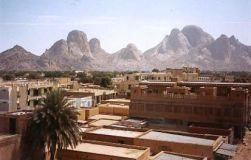Sudanese honeymooners seek out natural beauty in eastern city
Oct 5, 2005 (KASSALA) — Seated at a low table, a young woman wrapped in a pale yellow robe pours coffee for her new husband from a round-bottomed clay jug known as a jabana, her smiling eyes downcast, gold bracelets jangling on her wrist.
 Nearby, a new husband carries his wife’s high-heeled orange sandals in one hand and holds her arm with the other as they navigate their way up the rocky mountain path to drink from a spring that, according to tradition, promises fertility.
Nearby, a new husband carries his wife’s high-heeled orange sandals in one hand and holds her arm with the other as they navigate their way up the rocky mountain path to drink from a spring that, according to tradition, promises fertility.
The honeymooners at Toteil mountain park are easy to spot, if not by their isolated two-ness among the many families and playful children, then by their bashful glances and by their fingertips, stained dark with henna for their recent marriage rites.
It was a typical crowd gathered on the mountain just before a recent sunset, for Kassala has been a top honeymoon destination for Sudanese for decades.
“We came because of the mountains and the Gash River,” Mawahib Abdullah, 23, says after dipping a plastic pitcher into the spring and taking a drink. She puts her sandals back on and giggles as she clutches her husband’s arm for balance, readjusting the filmy, bright orange wrap over her head. “So many people I know came here for their honeymoons.”
The couple, married eight days earlier in Khartoum, the capital, grin at each other as they descend the trail toward the small coffee shop and souvenir stands.
They pass a man with a camera around his neck who tries to lure them with his fold-out album of photos showing couples in various poses in front of the red rocks. “Three photos for 3,000 dinars (US$12,A10),” he cajoles, but they continue on their way.
It is easy to see what makes the city on the Eritrean border such a draw for romance. It is a rare spot of beauty and lushness in the otherwise desert landscape of northern Sudan. While southern Sudan is green, it has been torn by a war that is only now ending after 21 years.
Kassala also has the benefit of being accessible. The 600-kilometer (370-mile) road from Khartoum may be rutted, broken and narrow, but it is still one of the better routes in a sprawling country of poverty and conflict.
The city boasts lush gardens and abundant orchards of grapefruit, pomegranates, oranges, bananas and melons, and its Khatimiya mosque is the center of an order of Sufi Islam.
But Kassala’s most prominent attraction is the Taka Mountains, whose granite domes rise abruptly from the flat plains and loom over the city.
On the outskirts of town, semi-nomadic camel herders from the Rashaida tribe set up goatskin tents when the summer rains come, and the women of the tribe are a distinct presence in the city’s bustling markets with beaded veils covering their noses and mouths.
The Gash River flows through Kassala. From September to June the riverbed is dry, but rainy season brings a fast-flowing and dangerous river – in 2003 the river flooded almost the entire city of nearly 300,000 people, killing dozens and destroying hundreds of homes.
The hotels are busiest in late July, when temperatures are cooled by nightly thunderstorms and the Gash flows strong.
“It’s newlywed season,” says one hotel employee. “The weather is nicer, the mountains are beautiful. They love it here.”
At the mountain park, Marwa Ali, 23, and her husband, Bakri Ahmed, 32, sit in the coffee shop separated by a male relative as they enjoy the sunset while snacking on popcorn, candies and sweet Sudanese coffee.
Marwa shyly says it is her first time outside Khartoum, and she is eager to see the rest of the city.
“I want to see the gardens, the mosque of Sidi Hassan,” she says, ticking sites off on her fingers, which are painted with intricate patterns in henna, leading to her hand and up her sleeves. Her feet and ankles are also decorated.
As the sky darkens, families and couples carefully pick their way back down the mountain path, some stopping to look at souvenir jabanas or buy candy.
One couple stands out for their intimacy among the modest Sudanese, who generally frown on public affection between men and women. Mohammed Taglawey and Nashwa Abdel-Gaffer have their arms around each other as they walk playfully pushing and poking each other and laughing.
The 20-year-old college students say they sneaked away from their homes in town to meet at the mountain because it is the most romantic site they know.
Taglawey complains he cannot be open about his girlfriend – neither of their families know they are dating – and says he hopes Sudan will become more relaxed.
“It’s changing. And we young people will find a way,” he says, stroking his girlfriend’s hand.
Then he leans over and says quietly: “Do you want to know a secret? I love her so much.”
(AP)

maykal
Sudanese honeymooners seek out natural beauty in eastern city
If you are going to use one of my photos for this article, you could at least ask permission first, and credit the photo to me!